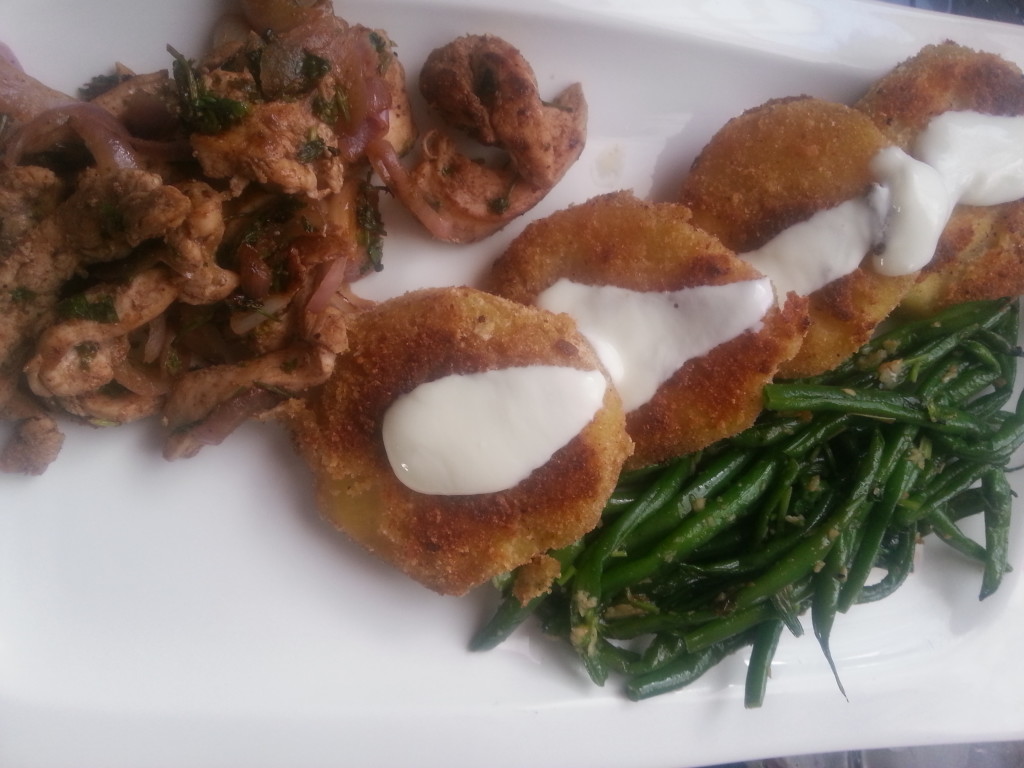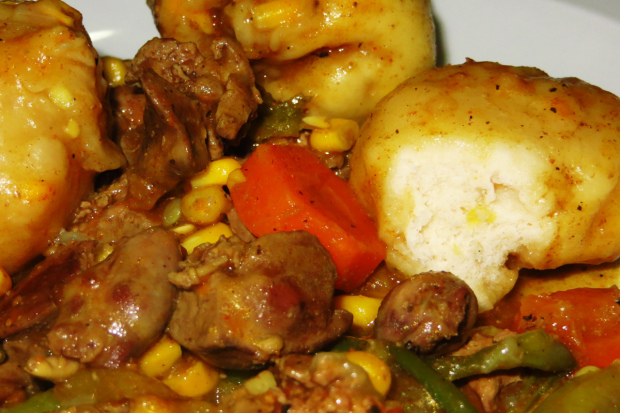
Breadcrumbs sweet potatoes dish. Photo by Wangeci Wandere. Used with permission.
Food is life. It unites us all. Here at Global Voices, we love food, so we bring you eight yummy food blogs from Sub-Saharan Africa.
Scrumptious South Africa is a food blog run by Jane-Anne Hobbs Rayner, who is a cook, food writer, recipe developer and professional freelance journalist:
My site Scrumptious, which pioneered recipe blogging in South Africa almost seven years ago, is an independent food blog all about careful, patient home cooking, and about how to prepare excellent food for family and friends.
The recipes on this blog are, with a few early exceptions, my original work: I have devised, developed and thoroughly tested them myself. Of course, there are very few recipes these days that can be called truly original: every recipe builds on the work and patient testing of many generations of talented cooks, chefs and alchemists. Where I've adapted an existing recipe, or drawn on the work of other cookery writers, or found inspiration in someone else's recipe, I always say so.

The logo of Scrumptious South Africa blog. Used with permission.
2. Dobby's Signature
This is a Nigerian food blog by Nigerian blogger Dobby:
I'm dobby, a culinary enthusiast with a flair for Local Cuisines in Nigeria and around the globe. Welcome to my online recipe diary where I explore and showcase dishes from my Nigerian kitchen to inspire meals in yours. Let me confess, i'm not a professional chef…..Yeah! i'm not. But Cooking is one of my major hobbies and i do it well. Whenever i'm not cooking, i do illustrations/graphic designs too as shown on the blog. So, Stick around and explore Nigerian food from my own point of view.
Dobby's signature is a Nigerian Food Blog focused on Showcasing Nigerian dishes, Exploring Traditional food recipes and Flavors with strong emphasis on Photography, Diversity, Vibrant colors and Health benefits… Just the way Mama makes it ;)
Oumou Bah from Guinea shares her passion for food on her blog. The blog also uses YouTube videos:
I love the fact that in Africa, mealtimes are moments of great gatherings for big families. In most African countries such as Mali, Somalia, through Guinea, Nigeria and Eritrea, people use their fingers instead of a spoon, fork and knife to eat which make the meals more special and taste so unique.
The dishes are mostly made of meat, chicken, fish and vegetables all usually accompanied by the staple such as rice,FouFou, Tô, ugali and many more . Peppers and spices are widely used, which gives the taste especially African cuisine. Also without forgetting the vegetable leaves such as sweet potatoes leaves, Ukazi, bitter leaves and so on . Yams, corn, okra, and tomatoes and many other vegetables are also heavily used varies according to the region.
The YouTube video below from Kadi African Recipes show how to make Attiéké, the main dish of the Ivory Cost:
After sharing recipes online on various sites since 2004, Miriam Rose Kinunda now runs the Taste of Tanzania blog:
Tanzania is located in East Africa (Indian Ocean is on the East). Since Persians visited the coast of East Africa dated as early as 17th century, they introduced many things including spices and some recipes; example, Pilau, Haluwa, samosa, Bagia, etc. Our diet is a mainly African, and a little bit of Indian and Arabic. I hope you will enjoy these simple recipes from Tanzania and a few of my favorate from other countries.
Miriam Rose Kinunda started to post Tanzanian recipes just for fun in June 2004 with the domain name miriammalaquias.com; In 2006 I changed to mirecipe.com and started to blog, In July 2009, I decided to give this site a name that fits, A taste of Tanzania
5. Chef Afrik
Adhis, the owner of Chef Afrik, plans on “cooking my way through Africa one country at a time”:
First started in November 2011, Chef Afrik is my African food and travel lovechild. The site's motto, “Cooking my way through Africa one country at a time”, indicates my pursuit as a Kenyan diasporan to discover the continent of Africa through its food. As well as showcasing food from all over the continent “In the Kitchen”, I also enjoy interviewing people who work with African food, whether as food writers, bloggers or chefs in my “Get to know” series.
Wangeci Wandere believes that anyone can cook no matter where they live. She started her food blog in a Kakuma refugee camp in Kenya:
Thanx for stopping by Foodie in the desert, my online home for recipes I try out and my culinary journeys from all around the place. Here, I share recipes that I have tried and loved anything from a simple stew to a complicated dessert, a few kitchen disasters and I will give you a few tips and tricks here and There.
I am a big believer that ANYBODY can cook whether you live in a bedsitter (studio apartment) or a lavish duplex, whether your a bachelor who just moved out of home or a wife with 4 kids. I started this blog in Kakuma refugee Camp, I live in a tiny studio apartment and I barely get any supplies so if I can do it so can you. So join me in discovering how to spice up your meals using supplies that you can find in your local supermarkets.
This is a blog written by Brandi Phiri, a graduate student in Botswana, who despised cooking until recently:

Madombi (dumplings), a local cuisine in Botswana, in chicken stew. Photo by Brandi Phiri. Used with permission.
I’ve never really been a fan of the kitchen or any chores involving it. Until very recently I despised the Kitchen, I mostly especially despised cooking, anyone in my family will attest to that!
But after finally moving into a campus flat equipped with a kitchen I realised I didn’t want to eat boring food. If I was forced to feed myself everyday it would be with good food!
Traditional African cooking (at least in southern Africa) doesn’t allow for much experimenting or variety. We don’t play fast and loose with spices like the west Africans or Indians, our baking is mostly limited to plain cakes,breads and buns, our staple food is nsima/pap/sadza/ugali/posho/fufu/bugari/phaletshe and we tend to favour meat stews. Of course there is slight variation from country to country. There’s absolutely nothing wrong with traditional African food, nothing at all however I yearn for something different at times, something to surprise my taste buds and that is how my culinary adventures began.
South African blogger Thuli started Mzansi Style Cuisine in 2011 to encourage young people to cook and provide them with an online platform to access traditional and indigenous dishes:
Indigenous dishes are not widely documented reason being that the knowledge was passed down from generation to generation by training young women. Nowadays things have changed, young women move to the city to get education and jobs before they could have that entire food heritage passed down to them by the older generation. Well, I hope to bridge that gap through this blog. In addition to that, I urge young people, both women and men, to spend more time with the older generation. By that I mean our grandparents, parents, uncles and aunts. Let us embrace them, listen and learn from their experiences. Knowing where one comes from makes for a grounded individual and there is nothing cooler than that.
There are many more African food blogs than those listed above. Do you have a favorite African food blog? Please share it in the comments section below.







14 comments
Yummy! Thank you for sharing. I would also advise to visit http://www.alicepegie.com Many recipes from West and Central Africa.
Hi Alice. Visited your site great one. Will be checking in from time to time :)
Great list of African food blogs. One of my favorite African food blogs is The African Gourmet http://theafricangourmet.blogspot.com/ thank you.
Fantastic. I love all these blog . I would also advise to visit http://www.talkingtonelly.com
Many Kenyan and African recipes. Thank you :)
Thank you for the feature and highlighting African food blogs! Tons of great blogs listed and there are MANY MANY more!
Every Blog here is worth every Minute …..Lovely
Check out this as well —-> http://shopit.co.ke/